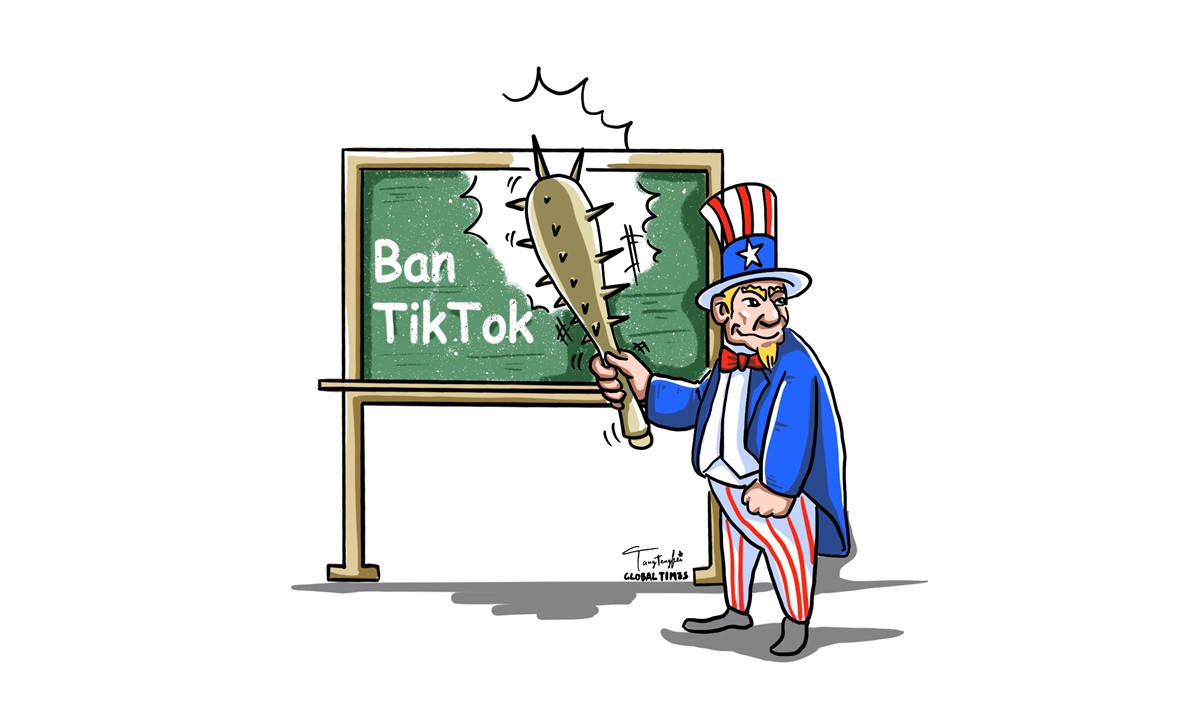Trump’s TikTok crackdown a lesson for Chinese tech firms
Source: Global Times Published: 2020/8/6 20:38:41

Illustration: Tang Tengfei/GT
Short video app TikTok has come under a global spotlight due to Trump administration's relentless attack. In a move that fully demonstrates the US government' bullying and the hypocrisy of its so-called free market doctrine, the attack on TikTok has offered a lesson for China's high-tech firms operating overseas.
TikTok is the international version of Chinese short-video platform Douyin, operating entirely outside of the Chinese mainland market. It enjoys a high level of popularity among younger generations and has been topping entertainment app download lists in many countries and regions. It is a rising mobile service business.
US President Donald Trump initially announced his intention to ban the Chinese-developed popular app on an unsubstantiated "national security" threat, and hours later he said the app should be sold to a US company within 45 days. And, Trump has gone so far as to declare a percentage of the price of the deal should go to the US government. It is blatant bullying.
The Trump administration has not pointed to any laws or regulations that would allow the app to continue operating in the market, though the company has shown willingness to cooperate. By comparison, Google chose to leave the Chinese market years ago due to its refusal to comply with Chinese laws.
Though Trump's latest moves will frustrate Chinese entrepreneurs and businesses in the short term, they will not stop the internationalization of many high-tech Chinese firms, which have accumulated state-of-the-art technology, talent and capital reserves. Rather, the case is offering a critical lesson for Chinese firms operating in the current international environment.
Instead of focusing on rapid growth, Chinese companies should introduce a full strategic framework for each target market, including plans for localization and public relations. Take TikTok's business in the US as an example. The company entered the US market about three years ago, meaning the window for it to build up capacities to deal with a potential crackdown has been drastically narrowed. Chinese companies should take note of this and adjust their strategies accordingly.
In the short term, firms may need to lean toward safe foreign markets rather than those with the highest potential so that they can maintain sustainable growth.
Overseas expansion has never been easy. In addition to increasing geopolitical risks, high-tech Chinese firms need to deal with issues such as cultural barriers. Southeast Asia and South Asia have become two major overseas markets for Chinese firms, but these markets have many different languages, religions, ethnic groups and legal systems.
China's high-tech firms have seen rapid development lately. Though overall internationalization efforts are still in their initial phase compared to Google or Microsoft, prospects remain promising as the firms have now developed advanced technology and strong creative power, and have accumulated talent.
In fact, other than the leading Chinese tech firms which have drawn global attention, many smaller firms have seen reasonable growth in overseas markets, with higher rates of return and less competition than at home.
Enterprises are essentially profit-oriented. While tackling various challenges, they are also shoring up their capacities and accumulating experience. And a short-term crisis can be transformed into motivational force to help the firms develop further in the future.
This article was compiled based on an interview with Wang Chao, founder of the Wenyuan Institute for Politics and Economics, a Beijing-based think tank. bizopinion@globaltimes.com.cn
Posted in: EXPERT ASSESSMENT